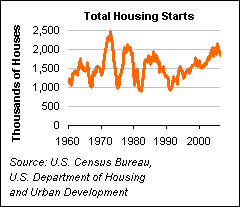All Real Estate is... Global?
Real Money contributor and ING Resident-Guru Jim Griffin wonders if all the talk of a housing implosion might be blown way out of proportion.
More importantly, he reasons, the housing bears could be missing what might be a global phenomenom that kicked in around 1990.

And if that is the case, then the economic bears might be missing out on what could be a longer economic cycle.
There's a subtext worth careful consideration whether you agree with Mr. Griffin's thesis or not: there are indeed aspects of this cycle that have confounded a great many thoughtful people. Well, what if the market keeps going up even as the doomsday drums get louder and louder? How many of us are hardwired to admit we were wrong?
More importantly, to paraphrase a constant theme voiced by Rodger Nusbaum, what if you totally believe the market will crash and you go 100% cash- or you sell your beautiful home and rent an apartment- and it turns out... you're wrong? Then what?
There has been quite a lot of concern about the housing outlook lately and its likely negative effect on the broader economy... But much of the argumentation strikes me as what-goes-up-must-come-down determinism; narrow in focus, divorced from context, and moralistic in tone.
More importantly, he reasons, the housing bears could be missing what might be a global phenomenom that kicked in around 1990.

It’s almost as if something changed back around 1990, and something surely did: a list might include the collapse of the Soviet Union and a Cold War peace dividend in the form of a shrinking federal budget deficit [Note: as a percentage of GDP], the missteps of Japanese economic policy, and the Teutonic austerity in Europe as it strove for monetary union. The emergence of China and other newly capitalist economies might also be penciled in.
And if that is the case, then the economic bears might be missing out on what could be a longer economic cycle.
If we were to want to spin the analysis in a positive direction, we could make a case that the business cycle – a new more fully globalized version and not the closed-economy shorthand model – has reached the self-sustaining phase that in past cycles caused the monetary authority to withdraw accommodation and strive for neutrality. If the case has merit, it implies a much longer expansion phase – it took a long time to get out of first gear – with the further implication that today’s worries about a 2007 recession are overdone. I don’t want to pound the table on that argument because there hasn’t yet been a full cycle, both up and down, within the globalized economy yet and I’d like to have a bit of real world experience before getting too cocky.
There's a subtext worth careful consideration whether you agree with Mr. Griffin's thesis or not: there are indeed aspects of this cycle that have confounded a great many thoughtful people. Well, what if the market keeps going up even as the doomsday drums get louder and louder? How many of us are hardwired to admit we were wrong?
More importantly, to paraphrase a constant theme voiced by Rodger Nusbaum, what if you totally believe the market will crash and you go 100% cash- or you sell your beautiful home and rent an apartment- and it turns out... you're wrong? Then what?

1 Comments:
Got it, thanks.
Here is my message to my community:
I am a professional and refuse to get caught up in the media addiction to the so called bubble that was first spotted by the WSJ in March, 2000. (not a typo)
Those writing and talking about the bubble in housing simply do not go tothe next step and answer the "Therefore....."
I have written extensively about this. Had anyone taken their advice in the past three years and sold....WHEN WOULD THEY HAVE COME BACK IN? Oh, btw, as renters, they simply make someone else rich.
I make no predictions about something that has never happened before.
People make bad buys in great markets and great buys in bad markets. There is always opportunity and that's not just a cliche in real estate. And, after 18 years in the trenches, I really know.
Post a Comment
<< Home